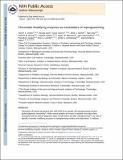Chromatin-modifying enzymes as modulators of reprogramming
Author(s)
Onder, Tamer T.; Kara, Nergis; Cherry, Anne; Sinha, Amit U.; Zhu, Nan; Bernt, Kathrin M.; Cahan, Patrick; Marcarci, B. Ogan; Unternaehrer, Juli; Armstrong, Scott A.; Daley, George Q.; Gupta, Piyush; Lander, Eric Steven; ... Show more Show less
DownloadGupta_Chromatin modifying.pdf (2.123Mb)
PUBLISHER_POLICY
Publisher Policy
Article is made available in accordance with the publisher's policy and may be subject to US copyright law. Please refer to the publisher's site for terms of use.
Terms of use
Metadata
Show full item recordAbstract
Generation of induced pluripotent stem cells (iPSCs) by somatic cell reprogramming involves global epigenetic remodelling. Whereas several proteins are known to regulate chromatin marks associated with the distinct epigenetic states of cells before and after reprogramming, the role of specific chromatin-modifying enzymes in reprogramming remains to be determined. To address how chromatin-modifying proteins influence reprogramming, we used short hairpin RNAs (shRNAs) to target genes in DNA and histone methylation pathways, and identified positive and negative modulators of iPSC generation. Whereas inhibition of the core components of the polycomb repressive complex 1 and 2, including the histone 3 lysine 27 methyltransferase EZH2, reduced reprogramming efficiency, suppression of SUV39H1, YY1 and DOT1L enhanced reprogramming. Specifically, inhibition of the H3K79 histone methyltransferase DOT1L by shRNA or a small molecule accelerated reprogramming, significantly increased the yield of iPSC colonies, and substituted for KLF4 and c-Myc (also known as MYC). Inhibition of DOT1L early in the reprogramming process is associated with a marked increase in two alternative factors, NANOG and LIN28, which play essential functional roles in the enhancement of reprogramming. Genome-wide analysis of H3K79me2 distribution revealed that fibroblast-specific genes associated with the epithelial to mesenchymal transition lose H3K79me2 in the initial phases of reprogramming. DOT1L inhibition facilitates the loss of this mark from genes that are fated to be repressed in the pluripotent state. These findings implicate specific chromatin-modifying enzymes as barriers to or facilitators of reprogramming, and demonstrate how modulation of chromatin-modifying enzymes can be exploited to more efficiently generate iPSCs with fewer exogenous transcription factors.
Date issued
2012-03Department
Massachusetts Institute of Technology. Department of Biology; Whitehead Institute for Biomedical ResearchJournal
Nature
Publisher
Nature Publishing Group
Citation
Onder, Tamer T., Nergis Kara, Anne Cherry, Amit U. Sinha, Nan Zhu, Kathrin M. Bernt, Patrick Cahan, et al. “Chromatin-modifying enzymes as modulators of reprogramming.” Nature 483, no. 7391 (March 4, 2012): 598-602.
Version: Author's final manuscript
ISSN
0028-0836
1476-4687